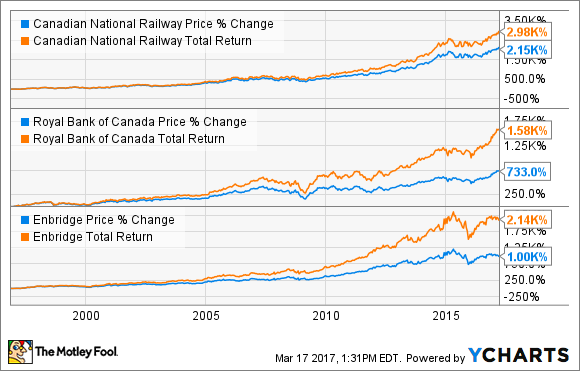How to Use the Power of Compounding to Beat Stock Markets

If you?ve had a chance to look at Warren Buffett?s conglomerate Berkshire Hathaway Inc.?s (NYSE:BRK.A)(NYSE:BRK.B) latest annual report, the first page will leave you dumbfounded. It shows Berkshire Hathaway stock?s performance since 1965. The stock has delivered annual compounded gains of 20.8%, or a jaw-dropping two million percentage overall gains, during those 52 years. That, my friends, is the power of compounding ? something Warren Buffett swears by.
The best part is that you too can watch the magic of compounding power your portfolio to the next level, provided you pick your stocks carefully and hold on to them for years, shutting yourself to the day-to-day noise that can affect investment decisions. With the market?s recent rally unnerving investors, now could be the best time to learn how to use compounding to grow your money.
How you can benefit from compounding
What exactly is compounding?
When you invest a sum of money at compound interest, you?ll earn interest on not just the original principal, but on the principal and interest as of the end of a period.
Say, for example, you invest $10,000 at an annual compound interest of 7%. At the end of the first year, you?ll have earned $700 in interest, leaving you with a total sum of $10,700. If you reinvest the entire amount in the second year, you?ll earn interest of 7% on the sum of $10,700 instead of just the original principal amount. That means you?ll earn an interest of $749, leaving you with $11,449, and so on.
It?s only when you calculate compound interest over a longer period that you realize its tremendous returns potential. With compounding, your $10,000 investment would be worth almost $100,000 by the end of the 34th year (not adjusted for inflation)! If interest was compounded monthly instead of yearly, you?d have $100,000 by the 33rd year.
It?s mind-boggling, isn?t it? The concept applies in the stock markets too. Consider Amazon.com, Inc. (NASDAQ:AMZN). If you?d bought $5,000 worth of Amazon stock during its IPO in 1997 and held on to your shares, you?d be a multi-millionaire by now.
Of course, Amazon-like returns are rare, but you can find multibaggers if you invest in solid businesses with a strong competitive edge and a track record of returns. You just need patience and hold on to our shares for a long time to allow compounding to do its work. It?s even better if the businesses pay credible dividends and you reinvest the dividends as long as you hold the shares.
Check out the chart below to see what a difference dividend reinvesting can make to your returns. All the three highlighted stocks ? Canadian National Railway Company (TSX:CNR)(NYSE:CNI), Royal Bank of Canada (TSX:RY)(NYSE:RY), and Enbridge Inc. (TSX:ENB)(NYSE:ENB) ? have been multibaggers on absolute stock price-appreciation basis, but their total returns (price appreciation + dividend) are dramatically higher.
See Canadian National Railway?s run up? It has returned nearly 3,000% since 1995. One reason is the railroad?s moat; it provides an essential service that enjoys strong barriers to entry and is the only transcontinental railroad in North America spanning three coasts. Given Canadian National Railway?s leading cost efficiency in the industry, robust balance sheet, and dividend history, I wouldn?t be surprised if the stock continues to grow manifold in the years to come.
The bottom line is this: just be patient with good stocks, and you could handily beat the market?s average returns in the long run, thanks to the magic of compounding.
Wait; there's a lot more you can learn about how to navigate market uncertainties. Just check out our special report below.
Six "pro" strategies for today's highly uncertain market
Motley Fool Canada's $250,000-real-money-portfolio service, Motley Fool Pro, is currently closed to new members. But lead advisor Jim Gilles is doing something special for investors who are worried about the market and where it will head in 2017.
He's revealing the six strategies he uses in Pro to help members guardrail their portfolios and make money in up, down, and sideways markets.
For a limited time you can download this "Pro 2017 Survival Guide" free of charge by simply clicking here.
More reading
TransCanada Corporation vs. Royal Bank of Canada: Which Is a Better TFSA Pick?
TFSA Investors: 3 Top Dividend Picks to Navigate an Uncertain Market
Does RioCan Real Estate Investment Trust or Enbridge Inc. Belong in Your RRSP?
Fool contributor Neha Chamaria has no position in any stocks mentioned. David Gardner owns shares of Amazon and Canadian National Railway. The Motley Fool owns shares of Amazon, Berkshire Hathaway (B shares), Canadian National Railway, and Enbridge. Canadian National Railway and Enbridge are recommendations of Stock Advisor Canada.
Wait; there's a lot more you can learn about how to navigate market uncertainties. Just check out our special report below.
Six "pro" strategies for today's highly uncertain market
Motley Fool Canada's $250,000-real-money-portfolio service, Motley Fool Pro, is currently closed to new members. But lead advisor Jim Gilles is doing something special for investors who are worried about the market and where it will head in 2017.
He's revealing the six strategies he uses in Pro to help members guardrail their portfolios and make money in up, down, and sideways markets.
For a limited time you can download this "Pro 2017 Survival Guide" free of charge by simply clicking here.
Fool contributor Neha Chamaria has no position in any stocks mentioned. David Gardner owns shares of Amazon and Canadian National Railway. The Motley Fool owns shares of Amazon, Berkshire Hathaway (B shares), Canadian National Railway, and Enbridge. Canadian National Railway and Enbridge are recommendations of Stock Advisor Canada.

 Yahoo Finance
Yahoo Finance 
